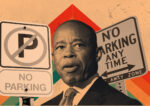Access to mass transit shaped a rezoning in the Bronx, but to secure approval from the local City Council member, the plan had to make room for residents’ cars.
The City Council on Thursday approved a rezoning in the Bronx that is expected to create as many as 7,000 apartments, 1,700 of them affordable, over the next 10 years. The rezoning targets 46 blocks around four new Metro-North stations planned for Co-op City, Hunts Point, Morris Park and Parkchester/Van Nest.
The stations are expected to be completed by 2027. City Council member Kristy Marmorato was adamant before, and even after the stations open, that parking requirements be included in the proposal, given that her district residents depend on cars to get around.
As a result, the City Council this month added parking mandates to the proposal, while also limiting density and capping height caps to better “align with neighborhood character,” Speaker Adrienne Adams said during a press conference before Thursday’s vote. The changes in density and height means 582 fewer housing units will be built, according to City Planning estimates.
Local Council members Marmorato and Amanda Farías also secured $500 million in investments for renovations to local parks, school improvements and other infrastructure upgrades.
The rezoning is the first major neighborhood rezoning approved under the Adams administration. Public review of the next, a 13-block stretch of Atlantic Avenue, is expected to begin later this year.
The parking changes cast a dark cloud over another administration priority, the City of Yes for Housing Opportunity, a text amendment that seeks to eliminate parking requirements for new housing development citywide.
That change would allow developers to include parking in their projects, if they so choose, though typically they would prefer to put those funds toward higher-income producing use, such as more housing units.
The proposal has faced pushback, with some City Council members arguing that the text amendment will alter “community character” and warning that “one-size does not fit all” — phrases that Marmorato used during a hearing last month on the Bronx rezoning.
The rezoning is a reminder that even if citywide mandates are ultimately eliminated, local City Council members can still influence land use proposals in their district and can demand parking and other changes as a condition of their support.
Ahead of the vote, Speaker Adrienne Adams said the outcome of this rezoning does not determine the fate of the City of Yes.
City Planning head Dan Garodnick did not seem to read doom in the changes to the rezoning, noting that modifications to zoning proposals is a “normal and healthy” part of the process.
Read more



“We appreciate the City Council’s thoughtfulness in the way they approached this significant rezoning,” Garodnick said during an interview Thursday. “We are happy to see it proceed, fundamentally, in the form that we wanted to see it.”
“We included the elimination of costly mandates in our housing proposal because we have seen too often parking coming at the expense of housing in many areas of the city,” he said. “We will continue to make our case to the public as to why that was an important change.”
